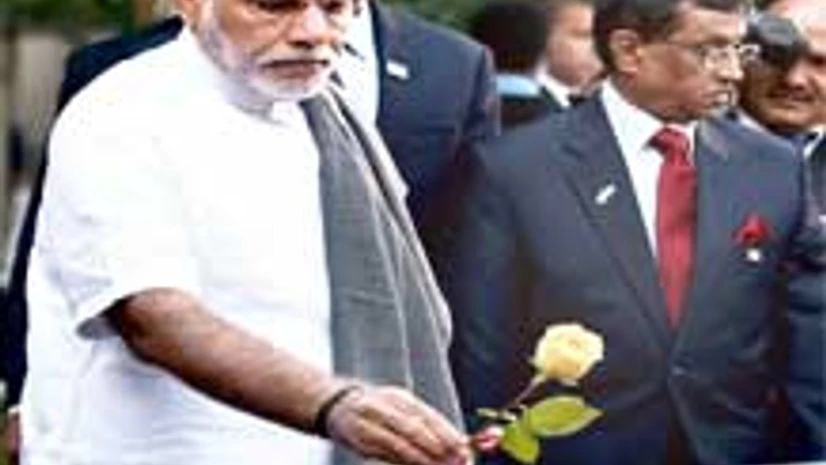Under a new leader, India on Saturday asserted itself in a blend of style and substance before the global community, as Prime Minister Narendra Modi made his maiden address to the United Nations General Assembly. Speaking for nearly 30 minutes, both extempore and from a prepared text in Hindi - the usual limit is around 15 minutes - Modi touched upon the Pakistan issue, fleetingly, among other things.
Pakistan was both present and absent in the speech. Referring to Pakistan Prime Minister Nawaz Sharif's Friday speech reiterating the issue of a plebiscite on Kashmir, Modi wondered if anything could be achieved by raising the matter at the UN. He said India wanted to have a dialogue with Pakistan, but not under the shadow of terrorism.
"Pakistan must also take its responsibility seriously to create an appropriate environment. Raising issues at this forum is not the way to make progress towards resolving issues between our two countries. Instead, we should be thinking about the victims of floods in Jammu & Kashmir. In India, we have organised massive flood relief operations and have also offered assistance for Pakistan-occupied Kashmir," he said.
More From This Section
The prime minister not only lapsed into Hindi colloquialism at arguably the most influential forum in the world, but poked fun playfully at institutions that tend to take themselves too seriously, such as the 'G' series of multilateral institutions that succeeded only in undermining the UN. He said the 'G' group would soon run out of serial numbers and advised them to become 'G-All'.
Modi's speech was refreshing also for its candour. It was no surprise that he reaffirmed India's faith in multilateralism and asserted it was not a forum to raise bilateral issues. He also asserted that not one nation or group of nations could steer the United Nations and the affairs of the world. He lauded the efforts of 'Blue Helmets', the UN Peacekeeping force where India has a big presence, in trying to end want and hunger.
Modi did not pull his punches. He was forthright in saying that an "integrating" Asia-Pacific region was still concerned about maritime security, which is fundamental to its future - an indication of his concern at the designs of China in the South China Sea.
It was, however, to terrorism that he devoted a substantial part of his speech. Attacking those who differentiated between 'good terrorism' and 'bad terrorism', he said terrorism in any form was unacceptable. Worse, it was "taking new shape and new name. No country, big or small, in the North or the South, East or West, is free from its threat", he said, adding some were using it as a staging post to launch attacks and others were using it as an instrument of state policy.
"Today, even as seas, space and cyber space have become new instruments of prosperity, these could also become a new theatre of conflicts," Modi warned and asked countries in the UN to put their money where their mouth was: "Today, more than ever, the need for an international compact, which is the foundation of the United Nations, is stronger than before. While we speak of an interdependent world, have we become more united as nations?... On the one hand, we say our destinies are inter-linked; on the other, we still think in terms of zero-sum game. If the other benefits, I stand to lose." He added it was easy to be cynical and pessimistic: "Arre yaar jaane do," he said to illustrate his point about cynicism.
Asking members to reform the UN as an existential imperative - institutions that reflect the imperatives of the 20th century will not be effective in the 21st. It will face the risk of irrelevance; and we will face the risk of continuing turbulence with no one capable of addressing it - he asked the Assembly to adopt the Comprehensive Convention on International Terrorism. "We should ensure there will be peace, stability and order in the outer space and cyber space. We should work together to ensure all countries observe international rules and norms."
"I want to say three things: One, we should be honest in shouldering our responsibilities in meeting the challenges. The world had agreed on a beautiful balance of collective action - common but differentiated responsibilities. That should form the basis of continued action. This also means that the developed countries must fulfil their commitments for funding and technology transfer."
"Second, national action is imperative. Technology has made many things possible. We need imagination and commitment. India is prepared to share its technology and capabilities, just as we have announced a free satellite for the Saarc (South Asian Association for Regional Cooperation) countries."
"Third, we need to change our lifestyles. Energy not consumed is the cleanest energy. We can achieve the same level of development, prosperity and well being, without necessarily going down the path of reckless consumption. It does not mean that economies will suffer; it will mean our economies will take a different character," he said.
He also urged the world to be led by India's soft power - yoga, culture and belief in dialogue and peace - and asked the UN to adopt an International Yoga Day.

)
